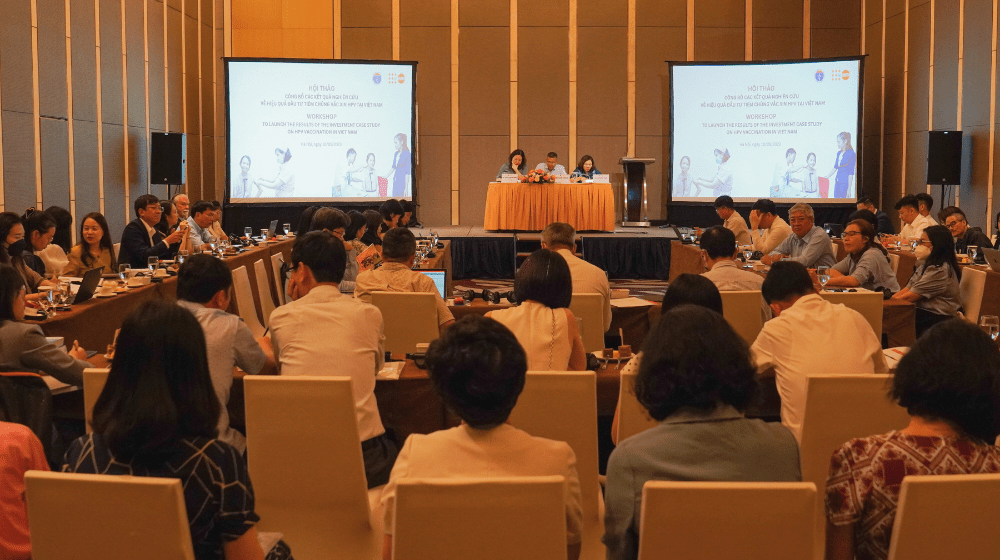Hanoi, 10 May 2023: Comprehensive investment HPV vaccination and cervical cancer screening and treatment can yield substantial socio-economic returns and elimination of the disease for the Vietnamese society.
This is the conclusion of the Investment Case Study on HPV Vaccination in Vietnam, which was undertaken by UNFPA in collaboration with the National Institute of Hygiene and Epidemiology¬¬, and Victoria University and Daffodil Institute (Australia). The Study presents comprehensive analyses of various options on HPV vaccination, cervical cancer screening and treatment, based on a wide range of validated data, on cost-effectiveness, economic and social returns and timeline to eliminate the disease.
Key findings of the study is launched in Hanoi today by UNFPA Vietnam and its partners to provide strong evidence to support the efforts of the Ministry of Health of Viet Nam and other agencies to scale up the HPV vaccination, cervical screening and treatment programme in the country. The study aims to inform national and sub-national policies for effective national rollout of comprehensive interventions for eliminating the disease among Vietnamese women.
Cervical cancer, which is caused by the human papillomavirus (HPV), is a major public health concern worldwide, including in Vietnam. In 2018, cervical cancer was the sixth most common cancer among Vietnamese women, with nearly 4,200 new cases and 2,420 deaths.
Yet, cervical cancer is preventable. To eliminate it, WHO calls on all countries to take concrete measures to achieve 90% of girls fully vaccinated with the HPV vaccine by the age of 15; 70% of women screened using a high-performance test by the age of 35 and again by the age of 45; and 90% of women with pre-cancer treated as well as 90% of women with invasive cancer managed by 2030.
In Vietnam, the HPV vaccination rate and the cervical cancer screening rate are low. According to the SDGs Survey on Women and Children, which was conducted by the General Statistics Office in 2021 with support from UNFPA and UNICEF, only 12% of women and girls aged 15-29 are vaccinated, and only 28% of women aged 30-49 have been screened so far.
The Study reveals that it is possible that Vietnam can eliminate cervical cancer in the next 30 years, if HPV vaccination is scaled up to cover 90% of adolescent girls; 70% of women receive HPV-based screening; and 90% of women with pre-cancer and invasive cervical cancer receive adequate treatment. The comprehensive combination of HPV vaccination, screening and treatment could eliminate cervical cancer in the country 29 years earlier than only HPV vaccination intervention. The study estimates that one dollar invested in cervical cancer prevention programmes can return between around 5-11 dollars in terms of economic benefits, and between 8-20 dollars when economic and social benefits combined.
In her opening speech at the launch of the study, Mrs. Naomi Kitahara, the UNFPA Representative for Vietnam highlighted the significant findings of the Study. Mrs. Naomi Kitahara stressed: “We trust that validated evidence presented in this meeting will provide a signal for policy makers, health professionals, civil society organizations, researchers, and development partners to advocate for and roll out on the implementation of plans for cervical cancer prevention and control, and align and accelerate the efforts towards cervical-cancer free future for Viet Nam. UNFPA is fully committed to supporting the Government of Viet Nam and its partners in rolling out HPV vaccination in the country.”
For her part, Associate Professor Duong Thi Hong, Deputy Director of the National Institute of Hygiene and Epidemiology of the Ministry of Health shared how the study was conducted: “The study provides strong evidence on the cost - effectiveness and the return of-investment as well as the estimated timeline for cervical cancer elimination in Vietnam. These scientific body of evidence are worthwhile for the Government to consider for allocating required resources to develop optimal strategies on cervical cancer prevention and control in Vietnam.”
We must act now, and should not leave anyone behind, including women with, or at risk of cervical cancer. We can eliminate cervical cancer as a public health problem in Viet Nam and improve the sexual and reproductive health status of the population.
For further information, please contact:
Ms. Dinh Thu Huong | UNFPA Communications Officer
Tel: 0913 301 539 | Email: dhuong@unfpa.org


